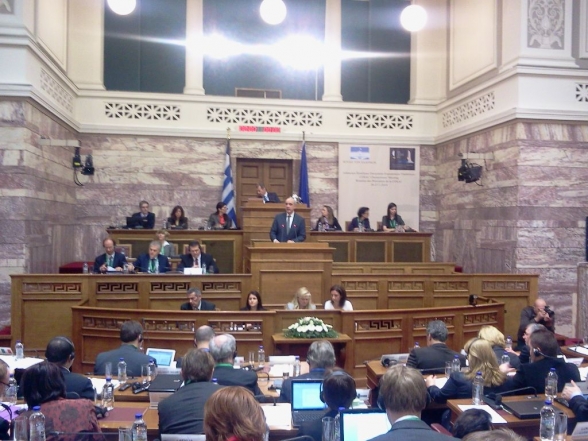Meeting of the EU Affairs Committee Chairpersons of the national parliaments of the European Union member states – COSAC, organised under the Hellenic presiding over the European Union, and opened by the Speaker of the Hellenic Parliament Mr Vangelis Meimarakis, was held in Athens today. In his opening address, he pointed out that COSAC had returned to the homeland of democracy for the fifth time, at the moment when the Union was facing a democratic deficit. The world economic crisis, unemployment, primarily of the younger generation, and scepticism of the citizens towards the decisions made in Brussels have been marking the past years - said the Speaker of the Hellenic Parliament. Reflecting upon the Greek image in the Union, he said that his country had not created the crisis, but, under its influence, had been forced to ask for help from other member states, relying on the solidarity as one of the pillars of the European Union. He pointed out that the crisis represented a challenge for resolving problems and oversights in governance, and what was needed was stronger cooperation of the national parliaments of member states with the European Union institutions, or control over the issues relating to the European policies.
It was pointed out that the crisis had brought about major economic problems, which had spilled over into other areas of life as well, threatening democratic identity of the entire European process; therefore the politicians had the task of presenting new ideas and opportunities for overcoming the existing crisis. The Brusselisation of the problems and nationalisation of the success has been harmful to the European ideas, upon which the European Union had been founded and developed, and this has been making the recovery process even harder. The Lisbon Treaty ensured that the citizens had the European policy creation process, which apparently was not a novelty known to the citizens, and therefore the transparency and functionality of the system was of special importance for further development of the Union as a whole.
The priorities of the Hellenic semi-annual presidency over the EU are: employment and cohesion, economic growth, further integration and stability of the euro-zone, migrations, border protection and maritime policy. The EU enlargement is not among the top priorities, but it has been pointed out at the meeting that the Greece would work on these issues as well, i.e. that it has been planning to undertake concrete steps in accordance with the country-specific needs. The Hellenic presidency will also be marked by the elections for the European Parliament, which are being held in May.
Draft of the 21st Performance Report of COSAC was also considered at the meeting, and at the focus of the conversation was the political situation in Ukraine.
Mr Slaven Radunović, the Chairperson of the Committee on European Integration also participated at the meeting, while also having multiple bilateral meetings at the marginalia of the gathering.









